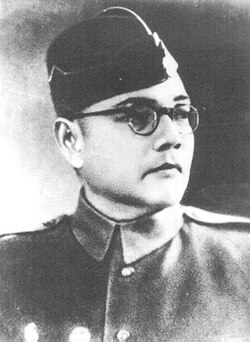Personal Information
- Date of Birth: 23-Jan-1897
- Place of Birth: Cuttack, Orissa
- Nationality: Indian
- Occupation: Freedom Fighter
- Era: Early-mid 20th century
Summary
Biography
Subhas Chandra Bose, also known as Netaji, was a prominent Indian nationalist leader born on January 23, 1897, in Cuttack, Orissa, during British rule in India. He emerged as a powerful force in the Indian struggle for independence, inspiring millions with his fearless patriotism and calling for direct action against British colonialism. Bose was born into a wealthy and influential Bengali family; his father, Janakinath Bose, was a lawyer and government pleader. Early on, Bose developed a deep love for India, influenced by his mother and his headmaster, who instilled in him pride in the country’s ancient heritage.
Educated initially in Cuttack and later in Calcutta, Bose topped the Indian Civil Services preliminary exam in England but chose to resign from the ICS to join the nationalist movement led by Mahatma Gandhi and the Indian National Congress (INC) upon returning to India in 1921. This decision marked his total commitment to India’s independence cause. He quickly rose through the ranks of the Congress, taking on roles such as general secretary and president of the Indian Youth Congress, and later becoming a leading figure in Bengal’s nationalist politics. His early activism brought him multiple imprisonments and even exile, during which he continued to strengthen his revolutionary resolve.
Bose's political ideology was notably more radical than Gandhi’s; he believed that India’s freedom required armed struggle and was critical of Gandhi’s strict non-violence. He called for more militant confrontation with the British, which caused tension within the Congress leadership. Despite this, Bose was elected Congress president in 1938 and 1939. During his tenure, he tried to shift the Indian National Congress towards a more socialist and militant stance. However, disputes over the approach towards the princely states and the overall strategy caused many Congress leaders to resign, and Bose himself was eventually forced out from the party leadership.
During World War II, Bose's opposition to British rule took an international turn. In 1941, he escaped house arrest in Calcutta disguised as a Muslim cleric and embarked on a daring journey through Afghanistan and the Soviet Union to reach Germany. There, he sought support from the Axis powers to free India. In Germany, he formed the Indian Legion from Indian prisoners of war and Indian expatriates. Bose was conferred the honorific "Netaji," meaning "Respected Leader," by his troops in Germany in 1942. However, his ultimate objective was to liberate India, so he moved to Japanese-occupied Southeast Asia in 1943.
In Singapore, Bose revitalized the Indian National Army (INA), which had been initially formed by Indian prisoners of war captured by the Japanese. He reorganized and expanded the INA, recruiting thousands of Indian expatriates and prisoners with the goal of marching into India to oust the British. On October 21, 1943, Bose declared the formation of the Provisional Government of Free India (Azad Hind) and became its head. The Indian Tricolor was raised in territories captured or influenced by the Japanese and INA, notably the Andaman and Nicobar Islands.
Under Bose's leadership, the INA engaged in combat against British forces in the northeastern frontier of India and Burma during 1944. Despite their valor and commitment, the INA was ultimately defeated, mainly due to lack of resources, military setbacks of Japan, and Allied forces' dominance. Nonetheless, Bose’s slogan "Tum Mujhe Khoon Do, Main Tumhe Azadi Doonga" ("Give me blood, and I shall give you freedom") captured the imagination and dedication of many Indians and remains a symbol of sacrifice and patriotism.
Subhas Chandra Bose’s legacy is complex and poignant. Though his alliances with Axis powers such as Nazi Germany and Imperial Japan remain controversial, his unyielding fight for India’s independence and the inspiration he provided to his compatriots have immortalized him in Indian history. Tragically, Bose’s life was cut short on August 18, 1945, when he died from injuries sustained in a plane crash in Taiwan. His death remains a subject of speculation and enduring mystery.
To many Indians, Netaji Subhas Chandra Bose remains a symbol of courage, self-sacrifice, and the unrelenting spirit of freedom. His efforts, particularly in motivating Indians to take up arms against colonial rule and organizing the INA as an alternative military force, played a crucial role in the eventual independence of India in 1947. His undying call for action and leadership helped shape the trajectory of Indian nationalism and left a legacy that continues to inspire generations.
In summary, Subhas Chandra Bose was a revolutionary leader who combined charismatic leadership, bold military strategy, and unwavering patriotism. From his early days in the Indian National Congress to his formation of the Indian National Army and the provisional government in exile, he dedicated his life to the liberation of India. His story is a testament to the passion and sacrifices it took to achieve India’s independence from British rule.
Personal Life
Personal Life: Bose was born into a large Bengali family with 14 children. He married Emilie Schenkl in 1937; their daughter Anita was born in 1942.
Spouse: Emilie Schenkl (Austrian woman)
Children: Anita Bose Pfaff, who became an economist
